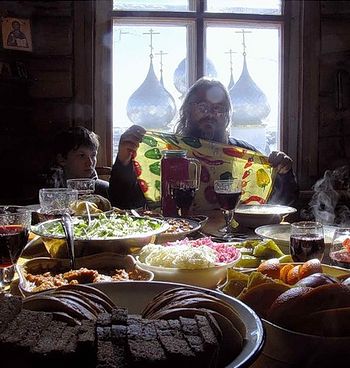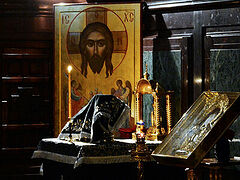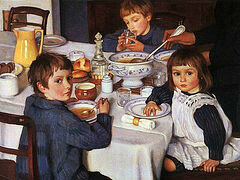Just like any spiritual labor, we fast for ourselves, not for God—in the sense that God doesn’t need it; it’s man who is healed, because it’s not God Who is sick, but infirm man. Infirm man is the one in heed of healing, inasmuch as he’s wounded by his own passions and sins.
 Metropolitan Athanasios of Limassol
Metropolitan Athanasios of Limassol
Many people, especially young people, have several objections to fasting: What benefit does it bring? Why do I have to fast and what is the meaning of this present Fast?
Of course, the Fathers of the Church have given many good interpretations on this issue, especially in terms of Great Lent, which is considered the Fast par excellence in the Church. It’s established by the sacred canons of the Local and Ecumenical Councils and is generally considered the strictest of all the Church fasts. Many interpretations—both theological and practical—have been given to explain why a man fasts.
There are those heretics who doubt fasting and say there’s no commandment from God anywhere in the Gospels or Scripture saying we should fast. Thus, they cancel fasting and accuse Orthodox Christians of supposedly keeping human traditions and commandments that aren’t present in Scripture.
The Fathers say that the first commandment that God gave man was a commandment about fasting. When God told Adam and Eve that they could eat from every tree in Paradise save the Tree of the Knowledge of Good and Evil, this was nothing other than a commandment about fasting. In other words, God didn’t permit man to eat from one specific tree—he was to abstain from it in order to observe God’s commandment.
The essence of the violation of the commandment, at least in its practical form, is the violation of the fast that God imposed upon man. Therefore, in the troparion we sing that through eating of the forbidden fruit, the devil led man out of Paradise, while Christ has again led him into Paradise through the Tree of the Cross.1 But Christ Himself, when He became Man for us, also gave us an example, fasting forty days and nights in the Jordan Desert where the Holy Spirit had led Him. In this desolate atmosphere and silence, in fasting and labors, the Lord defeated the devil who came to Him with three great temptations.
 Adam and Eve Therefore, we see that in its practical form, fasting is a Divine commandment, and the first commandment of God at that. The violation of it led to man’s expulsion from Paradise, but Christ as the New Adam began His teaching, His preaching and public ministry with fasting—thus He gave us an example.
Adam and Eve Therefore, we see that in its practical form, fasting is a Divine commandment, and the first commandment of God at that. The violation of it led to man’s expulsion from Paradise, but Christ as the New Adam began His teaching, His preaching and public ministry with fasting—thus He gave us an example.
The attitude towards fasting, which varies depending on the period, often seems saturated, so to speak, with scholasticism; and some people have even reduced it to a chemical analysis of fasting foods: Does this have vegetable oil or not? Does it have vinegar and a bunch of other things? What does this mean, what does that mean? They read all these inscriptions… on the back of the packaging they look at the ingredients and eventually come to complete confusion.
Let me tell you one funny story. One day, several fathers from the Holy Mountain and I were traveling by bus along the road from Ouranoupoli to Thessaloniki. Two fathers from Kavsokalyvia Skete were sitting in front of me; one was a little more modern, let’s say, while the other hadn’t left the Holy Mountain for many years. They were both zealots, that is, rather traditional, simple people, adhering to the old calendar in a rather fanatic way. The trip had already been three or four hours, and one offered the other some candy. He asked him:
“Don’t they have dairy?”
“Take it, blessed one! Dairy? What dairy? Eat it, there’s nothing here.”
To the regret of the other monk, he took it and read the ingredients. There were various ingredients there, and it said the candy contained 0.01% dairy by-product—something like that. Then a great load of nonsense arose on the bus: shouts, screams, arguments, a scandal: Someone broke the fast because of one hundredth of a percent of dairy by-product…
Many people delve too much into this question, and if it comes from a good thought about akrivia (that is, from a desire for strictness), it’s good. But we shouldn’t be excessively scholastic, because we shouldn’t give people outside the Church the impression that the most important thing that concerns us is whether there’s a drop of vegetable oil, rather than looking realistically at the essence and meaning of fasting.
And what’s important is that through fasting, a man receives awareness of his belonging to the Body of the Church. The Church, as a body, as one whole of the faithful, fasts in this period, and in this way. It gives us the feeling that we belong to the Body of the Church, obeying this commandment of the Church. Now is a period of fasting, and if we belong to the Body of the Church, it means we’re already members of this Body, and what the whole Body does, so do we.
There have been many in the Church who died martyrically, that is, they endured terrible torments and died because they refused to violate fasting, and they weren’t even required to renounce God, but only to give up fasting, to break the Fast. There were also instances when God miraculously saved whole Churches, cities, etc., when the pagans who ruled at that time wanted to defile in any way possible the people of God who were fasting. Thus, on the first Saturday of Great Lent, we celebrate the miracle of St. Theodore the Tyro, who miraculously intervened and protected God’s people, the Christians, from the desecration of food that the emperor wanted to commit, in order to strike a blow at their conscience and good custom.
Therefore, the first thing is that we acquire an ecclesiastical consciousness, the awareness that we’re members of the Church, and as such, we do what the whole Body does. All Orthodox Christians all over the whole world are fasting today, and that means we fast too. It means we’re members of this Body. We can’t separate ourselves, we can’t do anything ourselves; the people of God can’t follow one path while we follow another.
The Church isn’t something indefinite, isn’t something abstract, but a Body consisting of people: You either belong to the Church or you’re outside of it. We make up the Church when we’re in church; we make up the Church when two or three of us are gathered in the name of the Lord Jesus Christ; and we make up the Church when we’re in unity with the rest of the Church.
 The Temptations of Christ in the desert. Fresco from Dionysiou Monastery, Mt. Athos
The Temptations of Christ in the desert. Fresco from Dionysiou Monastery, Mt. Athos
You see, often the criterion of many things in the Church isn’t so much whether or not something is in accordance with the rules of the Church. It’s much more important whether or not the rest of the Orthodox Churches recognize this action . In other words, it’s important for us that we, for example, have communion with all the Orthodox Churches. That’s what the poor Old Calendarists don’t understand—that it’s important to belong to the Body of the Church, and not to protect, so to speak, certain rules that you consider to be in accordance with your life.
Above all, you need to be received by the whole Orthodox Church, so that you’re in communion with it. You see that when we all go, for example, to Russia, we commune; we go to the church where the Patriarch services, and we serve with him and take Communion. When we go to the Holy Mountain, we serve and commune. When we go to Jerusalem, we commune. When we go to Greece, to Syria—in short, wherever there are Orthodox Churches, and we’re in Sacramental communion with all of them. We serve with them, and they with us, and we commune of the same chalice. That means we’re members of the one Body of the Church.
But schismatics, such as the Old Calendarists, although they don’t have any incorrect dogmas, at least in the theory of their lives, won’t concelebrate; they won’t be received by other Churches that adhere to the old calendar, such as the Church in Jerusalem, on the Holy Mountain, in Russia, and so on, which don’t concelebrate with the Old Calendarists from Greece and Cyprus. In theory, these people have the same faith, but in practice they have broken away from the Body of the Church; they have rejected it as heretics and have created their own church that believes the same as we do. They want to look stricter and more traditional than us even in the smallest things, but despite this, they don’t have communion with the rest of the Church. Therefore, their situation, as well as their salvation, is very problematic.
Therefore, to belong to the Church means to belong to that real body of the Church that consists of bishops, presbyters, deacons, monastics, and laity; together we make up this Body, which goes its own way and lives its own life. Today is the Fast—the Church fasts; tomorrow is Liturgy—the Church celebrates the Divine Liturgy; now it’s a feast—the Church celebrates. It’s very important that all of us Orthodox Christians celebrate all the feasts together, especially Pascha, all together, whereas before we didn’t celebrate it together. But the Ecumenical Councils defined it as necessary, precisely so there would be the feeling that we all belong to the Body of the Church, which is a real Body—not some abstract or spiritual body.
After this grows in us—which, in my opinion, is most important—other things that have a practical form, through the labor of fasting, benefits begin to come in our personal life. The first thing that happens is the cutting off of the will. When the Church tells you: “Look, today you’re not going to eat meat; you’re not going to eat this food, you’re going to eat something else.” But you don’t like this other food, you don’t want it, you don’t care for this food that the fast prescribes. But you eat it nonetheless, because it’s the Fast. Fasting allows you to eat precisely this, and not just whatever you want right now. For example, you want barbecue, but you don’t eat it. That means you’re cutting off your will.
What does cutting off the will mean? Among other things, it means that if you cut off your will in this simple matter, and in this specific instance you accept the will of the Church, then all the more you will learn then to cut off your will before your brother, before your spouse, your child, and even more so before the will of God. When our will, having self-love and many other things in it, collides with God’s will, then, naturally, it—our will must be cut off, exterminated; it must retreat so we can accept the will of God, which is expressed in the commandments of God.
Some may say: “But I don’t understand why it’s a sin.” They don’t understand. Indeed, as you know, there are some acts that are a sin for the Church, but it’s hard for someone to understand why exactly they’re sinful; what, in other words, is the essence of the sin in this specific act? Since they’re still spiritually immature and don’t have much discernment, these people must accept that it’s enough for them if God defines something as sin. When God says: “Don’t lie, don’t steal, don’t commit adultery, don’t covet your neighbor’s property, don’t take the name of God in vain, honor your parents,” then even though you still don’t understand the essence of the sin, still, you should at least take it as given at first: If God says it and defines it as a sin, then it’s a sin, a fall, and a break in the connection with God.
It's like when you go to the doctor and he tells you: “Don’t eat these foods.” Why? We don’t know what’s happening in our body when we eat this food; we don’t understand chemistry and all the processes happening inside us and we can harm our body. The doctor’s word is enough for us not to eat these foods. Then, if I have knowledge in biology, chemistry, and medicine, maybe I’ll understand the scientific reason for avoiding a particular food.
The same thing happens with the commandments of God. It’s a fact that a man might not understand them at first. That’s why we often hear how people ask during Confession:
 “But why is it a sin if I don’t disturb anyone, I have an effect on anyone, if I like it, and I don’t bother anyone?”
“But why is it a sin if I don’t disturb anyone, I have an effect on anyone, if I like it, and I don’t bother anyone?”
And indeed, you have to answer him about the essence of the sin in this given act, but how can someone who has just entered the Church understand this?
To understand this, you have to understand some other things first. Thus, we start with a given—namely that God says: This act is a sin, and He doesn’t bless it. Follow what’s been said and you’ll see where it leads you, what connection with God it will lead you to. And then, if you commit this act and break your connection with God, you’ll experientially understand the essence of the sin that alienates you from God through this act, and how, why, and how harmful it is.
The fasting that the Church offers us isn’t the perfection of the virtues, but only the first step; a great struggle is necessary for a man to reach perfection. This is the first: Cut off your will in relation to these things. What does, “I don’t want to eat this food, I want to eat something else,” mean? Whether you want to or not, you’re not going to eat the other food. You can’t eat it, my dear. You get the opportunity to practice cutting off your will, which naturally helps you in your relationship with God and others, and at the same time develops humility. When a man cuts off his own will, he humbles himself in practice, he retreats and then begins to struggle, to understand how great it is to be humble and accept the will of another in his life, and even more so the will of God.





